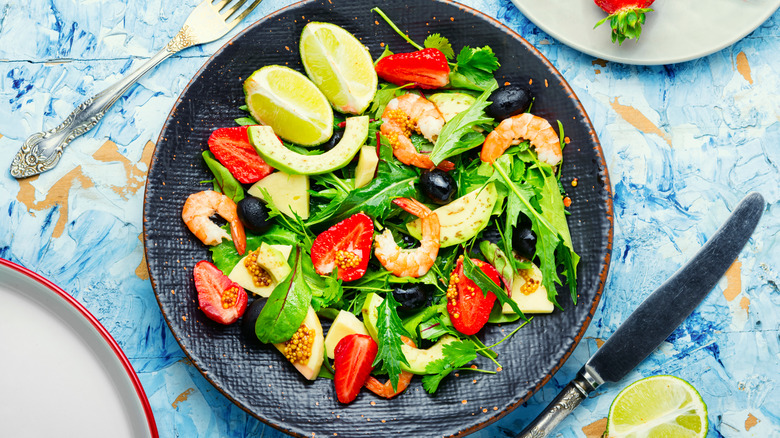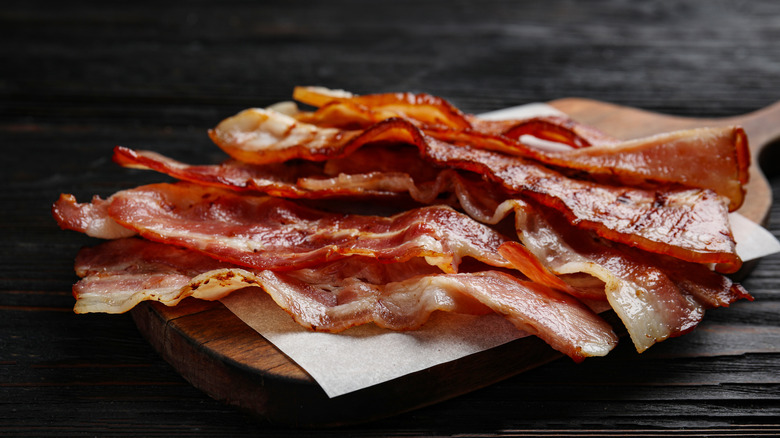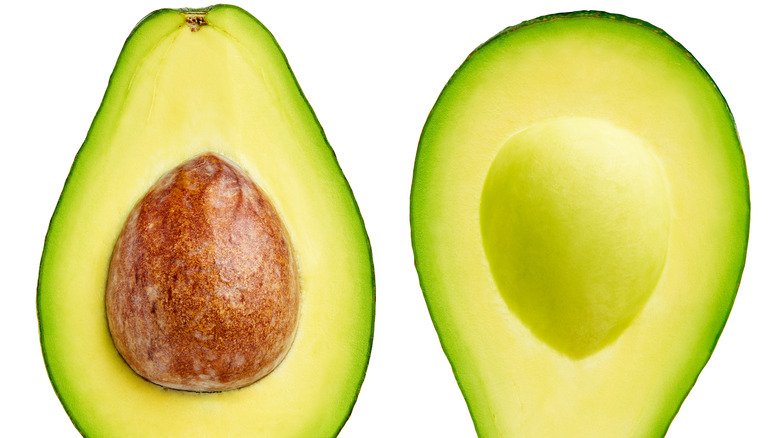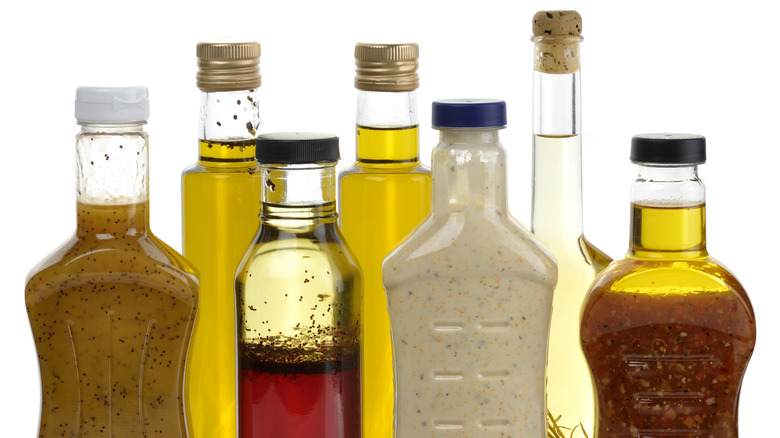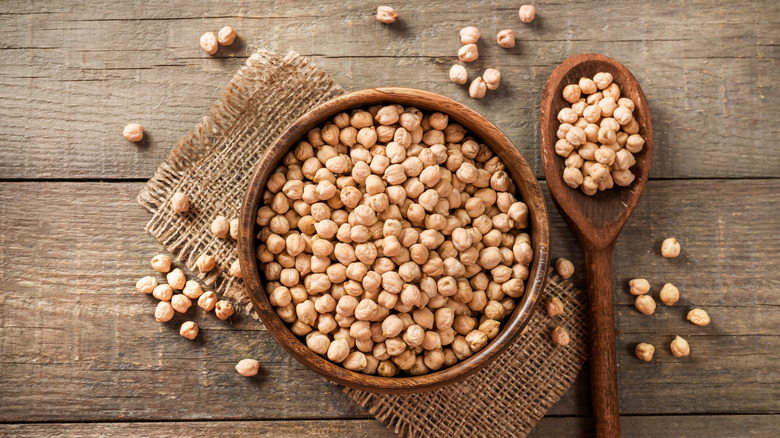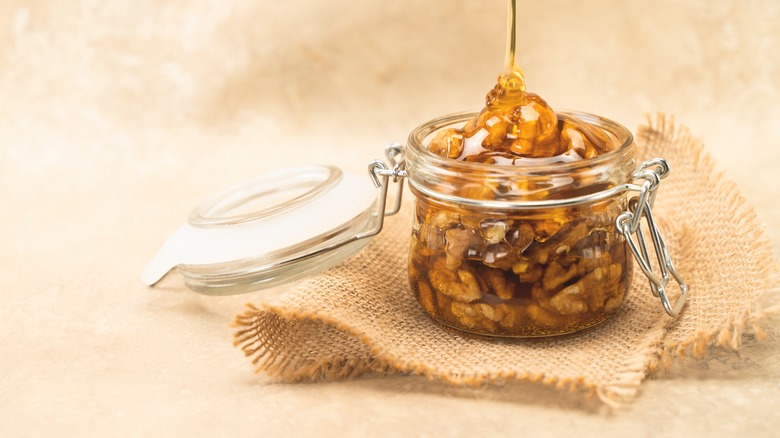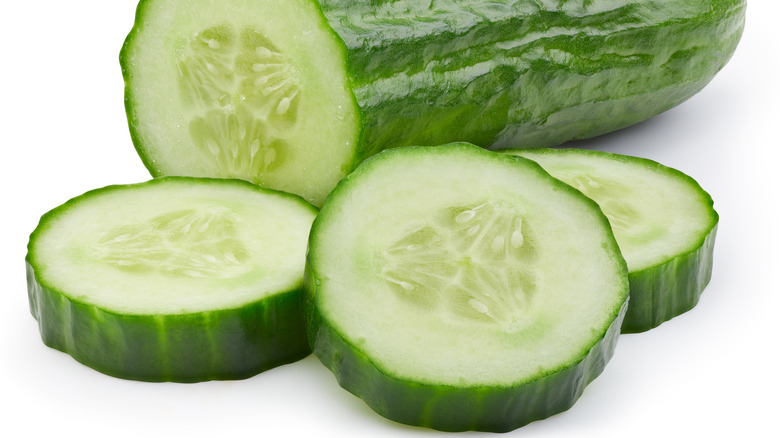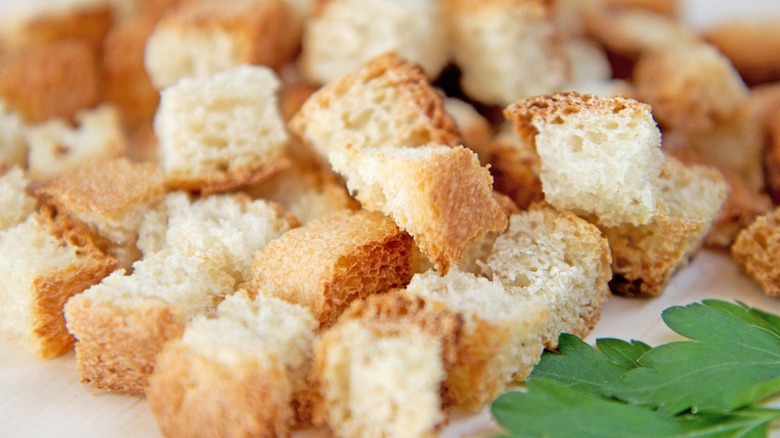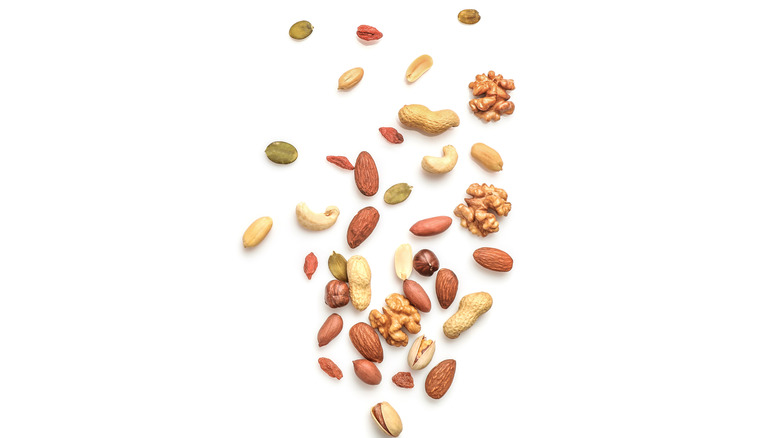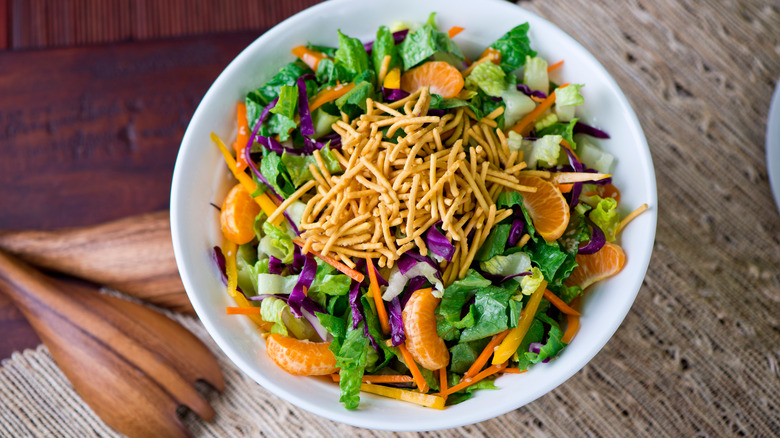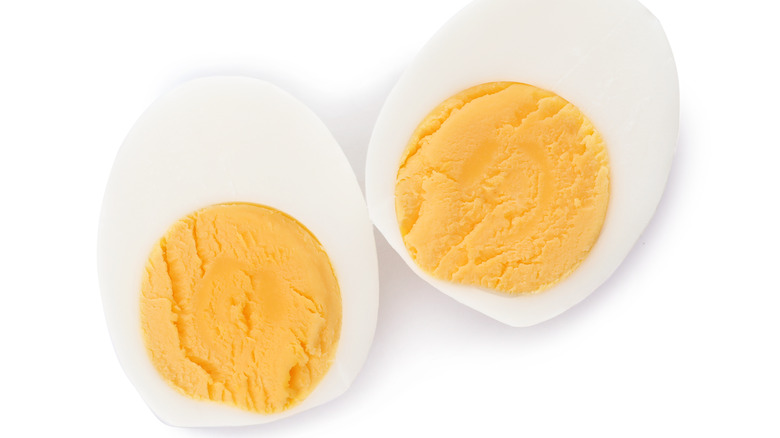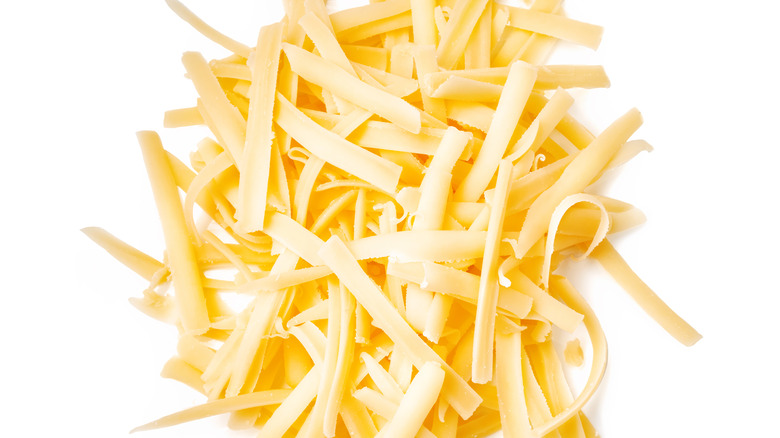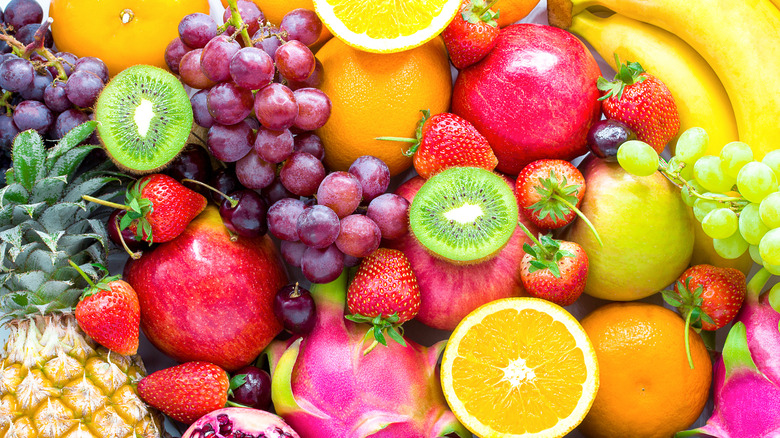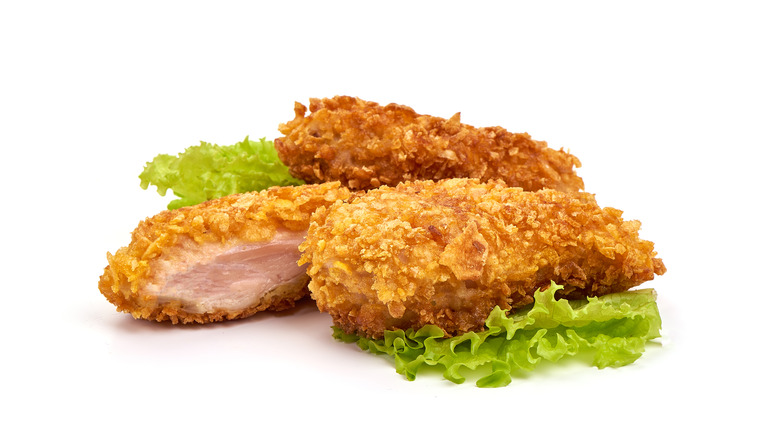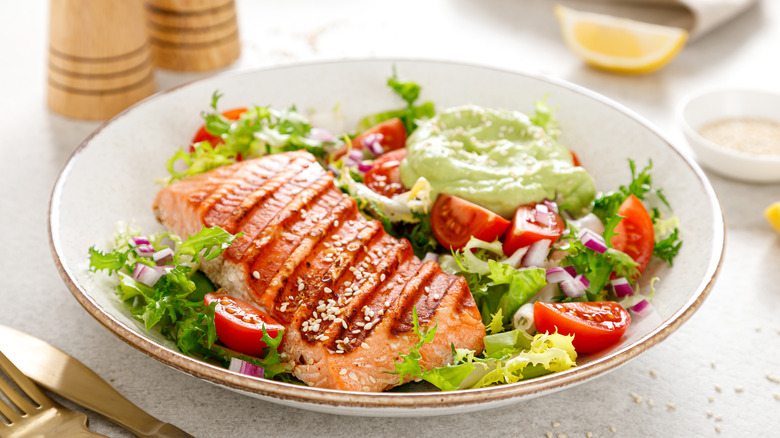7 Things To Put On Your Salad And 7 Things To Avoid
When it comes to eating healthfully, salads may be one of the first things that come to mind. Commonly thought of as a weight loss food, salads can pack a lot of nutrients in a single meal, and are a great way to meet your servings of vegetables for the day according to the Cleveland Clinic. Indeed, including a daily salad in your diet takes pressure off your other meals since you've essentially met your nutritional needs with the salad. Laura Jeffers, MEd, RD, LD spoke to The Cleveland Clinic to explain how incorporating salads into your diet can actually be a fun, creative process: "After you wrap salads into your diet regularly you'll be surprised at how you'll begin to feel good about what you're eating — and how creative you can get. Then, slowly build up to one each day, plus full-meal salads once or twice a week. You'll soon have more energy and feel better than ever." While loading your salad up with fresh fruits, vegetables, and greens is a great way to stay healthy, it can be easy to stray from the healthier path and take a turn for the ... not so healthy. Continue reading to discover some healthy ingredients to incorporate into your salad, and others to steer clear from.
Avoid: Bacon
Bacon is delicious, there are really no two ways about it. As tempting as it can be to add a tasty, salty, crispy, fatty piece of bacon to your salad, if your intention is to have a healthy meal while cutting back on unhealthy fats, you might want to leave it out. According to WebMD, 68% of the calories from bacon come from fat, and about 50% of that fat is saturated. And saturated fat can lead to an increase in cholesterol levels, which can subsequently contribute to heart disease and stroke. In addition to the high percentage of fat found in bacon, it's also on the "red list" of foods not to add to your salad because it's considered a processed meat. While it may sound extreme, WebMD reports that according to the American Institute for Cancer Research, processed meat is not considered safe to eat in any amount due to the connection between consistent consumption of processed meats and an increase in the risk of certain types of cancers, particularly prostate cancer. Bacon doesn't fall short on calories either, with a single 1-ounce serving clocking in at 140 calories.
Add: Avocado
Most people are probably fairly familiar with avocados by this point. Sliced over breakfast toast, loaded into smoothies, and diced into tacos ... the ways to eat avocados are essentially limitless. They also make for a nutritious and filling salad topping, and one that is packed with plenty of "good-for-you" fat, instead of the kind that could potentially clog your arteries, according to Healthline. While they are native to Mexico and Central America, the United States has taken up production of this nutritious fruit, with California producing more than 400 million pounds annually. Avocados are high in a number of vitamins and minerals including folate, vitamin E, copper, and magnesium. They are also an excellent source of fiber, providing 14 grams per serving, or approximately half of the recommended daily value. For this reason, experts explain that avocados can prove to be beneficial for gut health, as eating more fiber can assist in increasing the amount of healthy bacteria in your digestive tract. Furthermore, incorporating more avocados in your diet may assist you in your weight loss efforts because they help you stay full for longer due to their high amounts of both fiber and healthy fats.
Avoid: Low fat salad dressing
While the idea of consuming low fat foods may seem like a good idea to those who want to shed weight, research has proven the opposite may be true. Healthline explains that many processed foods that are labeled as low fat are often loaded with sugar and other unhealthy, low-nutrient ingredients. According to experts at the site, traditional full-fat salad dressings often contain healthy fats that can contribute to your body's absorption of antioxidants, and certain vitamins and minerals including A, D, E, and K. A study published by Molecular Nutrition & Food Research confirms these findings. Subjects in the study were fed salads with canola oil, soybean oil, and butter, and the researchers found that consuming these fats with the salad increased the absorption of carotenoids, or antioxidants in the blood. In contrast, salad dressings that are marketed as low fat typically contain no nutrients, do not provide any health benefits, and are additionally filled with sugar and preservatives. Certain artificial ingredients are required to mimic the texture of oil in low fat dressings, and they are typically better replaced by a healthier oil such as olive oil, which can help improve your heart health.
Add: Chickpeas
Like avocados, chickpeas are another incredibly versatile food packed with nutrition, and they've made their way into spreads, soups, and even desserts. While chickpeas may not be the most traditional salad topping, their versatility makes them a delicious addition to salads on both the savory and sweeter end of the spectrum. According to the Cleveland Clinic, chickpeas, also known as garbanzo beans, are a member of the legume family. The site explains that because of their high amount of protein and nutrients, some even consider them to be a superfood. One cup of chickpeas contains a whopping 14.5 grams of protein, 12.5 grams of dietary fiber, and only 4.25 grams of fat. Furthermore, the protein found in chickpeas is considered to be "complete," meaning chickpeas have all of the essential amino acids, making them an excellent source of protein for those who don't eat meat. They can even help you in your weight loss efforts because of their high fiber and protein content, which can help you stay full for longer. Experts at the clinic go on to say that chickpeas can also help prevent constipation, help control blood sugar, and promote heart health.
Avoid: Candied nuts
Crafting your salad can no doubt be a creative experience, and combining textures, colors, and flavors is a fun way to do something good for your body. While sweet and savory is a winning combination, there are certain sweet things that are better left off the greens and set aside for the occasional indulgence. According to Eat This, Not That!, one particular candied nut that landed on the "Worst Nuts For Weight Loss" list — toasted coconut cashews — boasts an impressive 12 grams of sugar per serving from corn syrup, sweetened coconut, and sugar. Experts at Verywell Fit encourage salad eaters to leave candied nuts off the table because of their empty and unnecessary calories, and suggest swapping them for raw almonds or walnuts instead.
If you're curious about the side effects that too much sugar could have on your health, experts at Healthline explain that excess sugar consumption can lead to chronic diseases including obesity and type 2 diabetes. Regarding weight gain, the site explains that consuming too much sugar can lead to your body's resistance to leptin, one of the hormones responsible for telling your body when it's time to stop eating. It's also been known to lead to heart disease, acne, and even cancer.
Add: Cucumbers
A classic, time tested salad topping, cucumbers are a refreshing, nutritious, and low calorie treat. According to WebMD, while most people consider cucumbers to be a vegetable, they are actually a fruit in the same family as watermelon and pumpkin. The site categorizes cucumbers into two types: those for pickling, and those for slicing. Slicing cucumbers are what are typically added to salads, while pickling cucumbers are much smaller in length and are used to make pickles. One serving of cucumbers, which is a half a cup, contains a modest 8 calories and meets 57% of the recommended daily value for vitamin K, which according to Medical News Today serves the function of helping with blood clotting, bone formation, and cognitive health. According to WebMD, cucumbers are 95% water, which makes them a great food to help you stay hydrated, and that they can also assist in relieving constipation due to their fiber content. They also contain a bit of vitamin A, which can assist in improving vision, boosting your immune system, and ensuring the proper functioning of your heart, lungs, and kidneys. Before comping down on this refreshing salad topping, remember to wash your cucumbers and peel them to remove pesticides, or buy organic cucumbers, leave the skin on, and just rinse them off.
Avoid: Croutons
For many, a salad without croutons may feel like a burger without a bun. While it might be instinctual to top your salad off with croutons, it is possible — and potentially beneficial to your health — to make a delicious salad without them. According to Verywell Fit, while croutons may not be the worst ingredient on this list to add to your salad, there are several good reasons to leave them off. For starters, they add empty calories to your salad by way of processed grains. Furthermore, experts say that croutons are sometimes fried, so the extra unsaturated fat from the oil may also be contributing to health concerns. Another Verywell Fit article shares that croutons contain approximately 9 grams of carbohydrates per .5-ounce serving, which are typically coming from starch. While carbohydrates can be okay in moderation, being heavy-handed with the croutons may increase the amount of carbs you are consuming, which according to Healthline can lead to spikes in blood sugar and weight gain. Furthermore, the bread that is used to make croutons is typically low in nutritional value as well as fiber.
Add: Non-candied nuts
While candied nuts may have made it onto the blacklist, non-candied nuts, on the other hand, are a nutritious way to adorn your salad. As Healthline explains, the health benefits of including nuts in your diet are essentially endless. Nuts are an excellent source of fiber, "good fats," as well as protein. Different nuts provide different nutritional benefits, and walnuts rank high on the list of good-for-you nuts. This popular salad topping contains 4 grams of protein per serving, as well as 50% of the daily value of copper. This nutrient helps your body produce "enzymes involved in energy production and neurotransmitter synthesis," according to Healthline, and is also linked to a reduction in factors that contribute to heart disease, including high blood pressure. Pecans are another popular salad topping, and a serving of the nut provides 13% of the daily value of the mineral zinc, which is known to help support immune health, DNA synthesis, and growth. Slivered almonds are another delicious salad topping that offer 45% of the daily value of vitamin E, which also serves as an antioxidant.
Avoid: Crispy toppings
Like it or not, things labeled as "crispy" on the restaurant menu may be hiding a dirty little secret. Salad toppings such as wontons, crispy noodles, and tortilla strips may bring some exciting textures to the mix, but according to the experts, they are probably not doing much for your health. Keri Glassman, celebrity nutritionist and founder of Nutritious Life, spoke to Self magazine and explained how "crispy" can often be code for fried. Of crunchy noodles in particular, Glassman explains that "they provide calories without any nutrients, and their high sodium content is only going to make you bloat." Experts at Verywell Fit also caution against adding the wontons that typically accompany Asian salads for the same reason. Topping your salad off with wontons can cost you 100 to 200 calories, as well as 7 to 13 grams of fat. Instead of adding wontons and other crispy toppings, Glassman suggested to Self to instead "add crunch by using a teaspoon of sunflower seeds or a crunchy veggie like jicama."
Add: Boiled eggs
Eggs can be a filling salad topping that in some ways can act as the star of the show. While eggs can be prepared many ways, some ways are definitely more healthy than others. According to Healthline, preparing your eggs by boiling them gives you a leg up in the health department by reducing the amount of calories added during preparation (as opposed to dishes like fried eggs, which might incorporate things like butter or oils). Experts at WebMD also acknowledge the benefits of including boiled eggs in your diet, explaining that they are an abundant source of protein, which can help you stay full for longer with only 78 calories per egg. The nutrients lutein and zeaxanthin are also found in boiled eggs, and actually have an antioxidant and anti-inflammatory effect that can contribute to eye health. Another Healthline article extolling the benefits of eggs goes as far as to call them "pretty much the perfect food" because of their high nutrient content. For those who have heard that eggs raise cholesterol levels, Healthline reframes this misconception and explains that eating eggs actually raises your "good" cholesterol levels and essentially modifies the "bad" cholesterol in a way that makes it less likely to lead to heart disease. As proof, Healthline reports that recent studies have found no connection between the consumption of eggs and the risk of heart disease or stroke from high cholesterol.
Avoid: Piling on the cheese
While in moderation cheese can be a deliciously nutritious snack, experts explain that it's probably best to not load up your salad with this treat. It's important to state that there are benefits to eating cheese due to its high levels of protein, vitamins, and calcium, but there are risks to making it a primary ingredient in your salad rather than a light garnish. According to Healthline, while cheese does carry those nutritional benefits, there are also risks associated with over-consumption. Those who are lactose intolerant might find themselves reacting poorly to cheese because their bodies are unable to digest lactose, which can trigger gas and bloating. Furthermore, if you are looking to lose weight by restricting calories, you need to be careful with cheese — a serving can contain 100 calories as well as high amounts of sodium, which may trigger a desire to overeat it. The type of cheese you select matters too, as some may be higher in fat and sodium than others. If you want to restrict your calories and still enjoy some cheese, you can consider sprinkling part-skim mozzarella, Swiss cheese, or feta lightly over your salad. If you are watching your sodium intake, experts also explain its best to stay away from harder cheeses, which use salt to age them.
Add: Fruit
It's probably common knowledge that fruit is always a good thing to incorporate into your diet. Furthermore, the sweetness and acidity of fruit can balance out other flavors in your salad (via Kitchn), making them a highly desirable addition. Different fruits carry unique benefits for your health that range from improving digestion, lowering inflammation, and reducing the risk of certain diseases, according to Medical News Today. Starting with lemons, the site explains that this sour fruit contains large amounts of vitamin C as well as other antioxidants. Furthermore, some of the flavonoids in lemons have "antibacterial, anticancer, and antidiabetic properties," according to experts at the site. Lemons can be incorporated into a healthy salad dressing when mixed with olive oil, a teaspoon of maple syrup, and salt and pepper, according to Healthline. Strawberries are another popular salad topping that provide a healthy amount of fiber as well as a type of flavonoid called anthocyanins that are known to contribute to heart health (via Medical News Today). Pomegranates, which are considered a superfood, contain high levels of antioxidants and polyphenols, which also reduce oxidation in the body that can ultimately lead to disease. Pomegranates also contain high levels of vitamin K, which contributes to blood and bone health.
Avoid: Breaded or fried meat
While the protein you may get from meat is good, slathering meat in batter and deep frying it may undo most of its health benefits. Fried chicken and fried shrimp may certainly appeal to your taste buds, but if you're trying to improve your health, it's probably best to leave it off your salad. Experts at Healthline explain what you probably already know: Frying food adds a lot of calories. In addition to the batter or flour that's being added to the food pre-frying, frying food in oils contributes to a loss of water and absorption of fat in food, which makes their calorie content skyrocket. An example Healthline provides is baked cod versus fried cod. While the baked cod contains 105 calories and 1 gram of fat, the deep fried cod has 232 calories and 12 grams of fat. Another side effect of frying food is the addition of trans fats, which are linked to conditions such as heart disease, diabetes, obesity, and even cancer. Trans fats are created after unsaturated fats undergo a process called hydrogenation, which can occur when oil is fried at high temperatures.
Add: Salmon
While topping your salad off with fried meat isn't ideal, including a fish like salmon has many more benefits for your health (as long as you don't batter and deep fry it). According to Healthline, along with eggs, salmon is one of the healthiest foods you can eat. The list of benefits is extensive, and the site starts out by mentioning its high levels of omega-3 fatty acids as one of salmon's top nutritional benefits. Experts at Healthline explain that omega-3 fatty acids have been known to reduce inflammation, lower blood pressure, and even lower the risk of cancer. One 3.5-ounce serving of salmon contains 2.3 grams of eicosapentaenoic acid (EPA) and docosahexaenoic acid (DHA), two types of omega-3 fatty acids. Your body does not naturally create omega-3 fatty acids, so they can only come from your diet. Salmon is also high in protein, providing 20 to 25 grams per serving. This meets standards set by new research which suggests including at least 20-30 grams of protein per meal, according to the site. Furthermore, salmon contains a considerable amount of B vitamins, providing more than 100% of the daily recommended value of B12, 56% of the daily recommended value of B6, and 63% of the daily recommended value of niacin. Because it is high in protein, it is also linked to weight loss for its ability to keep you full for longer.

